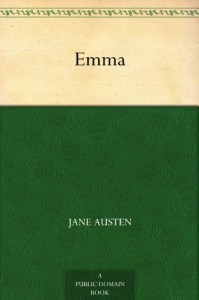Abandoned by Booklikes
Government drone by day and book lover and geek girl by night!
Currently reading








Did Not Really Like the Title Character Until Almost the End

I always feel so guilty when I am just so-so about a classic. I really tried to like "Emma" but in the end I didn't like the character or her father. I also laughed at her being called a matchmaker when she supposedly only got one person together (Mrs. Weston with Mr. Weston). I also didn't like Frank Churchill and thought Mr. Knightley was too good to be true. The ending with the resolve about what to do in order for him to be with the woman he loved made me shake my head. The writing was fine, I just thought this one dragged so much. Towards the end I maybe kept muttering can you hurry up already.
"Emma" follows Emma Woodhouse who is 20 years old and due to her father's land and wealth is gentry. We find out that Emma's mother died when she was quite young and her older sister Isabella married and has several children. Emma is quite determined to not marry and living with her father forever. Emma is also a bit blue after seeing her childhood governess (formerly Miss Taylor) newly married to Mr. Weston. Mr. Weston had been widowed for a number of years and after his wife's death allowed his wife's family (the Churchills) to raise their young son Frank. Emma's father is all doom and gloom about poor "Miss Taylor" (the man refuses to acknowledge her marriage and it's aggravating) and Emma does her best to cheer him out of his mood. Mr. Knightley (Emma's brother in law) comes to visit and Emma decides that she is going to focus on matchmaking others. Cause apparently she has nothing better to do. Emma quickly sets her sights on Harriet Smith. Harriet is 17, and is a parlor maid it seems at a local boarding house. Emma decides she will improve Harriet in order for her to get a man that Emma deems worthy of her. Of course misunderstanding occur and romances ebb and flow after Mr. Weston's adult son Frank returns.
Emma is a nitwit. That's all I got really. She misjudges everyone around her it seems. The only one that speaks plainly to her it seems is Mr. Knightley. I also wondered why she was so determined to see Harriet wed to the local vicar (Mr. Vicar) who even I could tell was not the least bit interested in her. Pretty much this whole book is just Emma being wrong and Mr. Knightley standing nearby to tell her about herself. Things don't really pick up in my opinion when Frank Churchill appears and Emma imagines herself in love with him for a bit.
Harriet is just there to do what Emma tells her. I honestly felt sorry for her and when she ends up rejecting one man due to Emma I just hard sighed.
Mr. Knightley didn't appeal to me the same way Mr. Darcy and Captain Wenworth did. However, I still thought he was a dashing hero for this book.
Frank Churchill sucked. I got nothing to say besides that. I didn't really buy some of the explanation that came afterwards. What happened seemed to me would be something that would get you cast out of a social circle, but whatever.
Jane Fairfax wasn't that interesting and I ended up wondering a bit about her at the end of the book.
Mr. Woodhouse was exhausting to the extreme. I maybe laughed at his daughter Isabella sounding like him too. We do get a weird glimpse via Mrs. Churchill about what will maybe become of them though in the future.
I seriously disliked Mr. Elton (though I was supposed to) and didn't like who he ended up marrying.
The writing was fine, I just found myself getting bored after a while. It's so strange to me that I didn't find this as gripping as "Pride and Prejudice" or "Persuasion." The flow was off through the whole book. I already said that I kept muttering for the book to hurry the heck up already.
The setting of the book takes place in 1815 England. We have a small country village with just a few families. After a while it started to feel a bit suffocating since it felt like no one else lived there besides Mr. Knightley, the Woodhouses, Mr. Elton, and the Bates. I think if things had changed with Emma going to London or meeting new people it would have livened things up.
The ending was not a surprise and everyone (well mostly everyone) gets a happy ending.






